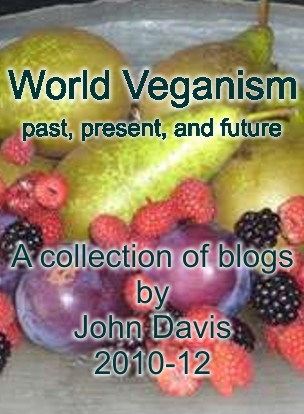February 9, 2011
My definition of an ovo- and/or lacto-vegetarian would be someone who deliberately and consistently chooses a diet of plant food plus eggs and/or dairy products, and sees that as their ideal diet. Not someone who occasionally goes in and out of that diet for whatever reason, or from any direction.
Accurate statistics are not always easy to obtain, but those I've seen tend to confirm my personal impressions all around the world - that relatively few younger people have been adopting this form of diet over the last ten years (apart from those born into it by religion and even many of those are moving away from it).
If I'm right then the number of consistent secular ovo- and/or lacto-vegetarians is not just reducing - more significantly they are getting older, and not being replaced. Which would inevitably mean it is only a matter of time before they die out.
Of course I'm not suggesting that ovo-lacto-veg food, cook-books, magazines or websites will disappear - there will be a vast and growing number of 'flexitarians' buying, cooking and eating it all. What is going faster than many realize, especially in the developed world, is the class of individuals who only eat that way, all the time.
And I'm certainly NOT saying that younger people are rejecting vegetarianism, just that particular form of it. It is being squeezed out on both sides by two major trends:
- Flexitarians
- people who deliberately choose vegetarian food (either ovo-lacto or just plants) for some of their main meals, but not all of them. Commercially-funded research is showing a huge increase in this approach in recent years, almost everywhere in the developed world - the various 'meat-free Monday' campaigns play on this of course. - Plantatarians - (or plantarians if you prefer)
I'm using this to mean people who live wholly on plant foods, including vegans and raw foodists - but many 'plantatarians' are solely concerned with health and diet, so not necessarily sharing all the vegan ethical values.
Considering those two approaches in more detail:
Flexitarians
- this includes an infinite variety of diets, defying the simplistic attempts at categorization we often see. Some use only organic/free-range meat, others cut out red meat, some only eat fish etc. etc.
- but they all consciously make some meals vegetarian, some with eggs/dairy, others rejecting that. The commercial research shows that in western countries up to 90% of the 'meat-free' food in supermarkets (especially the fake-meat varieties) is bought by flexitarians, not by committed vegetarians, and their numbers are rising dramatically
A recent report in a national UK newspaper suggested a remarkable tenfold difference in numbers: "Research by Mintel shows the number of consumers calling themselves 'vegetarian' has stuck stubbornly for the past five years at about six per cent of the overall food market. However, the number who agree with the statement 7 eat meat-free foods' is about 60 per cent'" ( www.telegraph.co.uk/.../Dont-call-it-vegetarian-it-is-meat-free.html )
Plantatarians
Tthe above comment about the static number of 'vegetarians' hides what is really happening - an equally remarkable rise in the number of those vegetarians that are now excluding eggs and dairy, thus moving to plant-foods only.
In the USA we have meticulous and detailed surveys commissioned by the Vegetarian Resource Group showing that 66% of genuine and consistent US vegetarians now exclude eggs and dairy completely (though some still use honey -www.vrg.org/nutshell/faq.htm#poll).
In the UK, some rather basic data suggests an equivalent rise from 20% to 40% dropping eggs and dairy in recent years. This needs verifying but would be entirely consistent with my personal experience of meeting veg*ns all around the UK. The majority of activists I meet are now vegan, and the majority of consistent ovo-lacto-vegetarians seem to be getting noticeably older.
In India the national survey from 2006 showed that older and more religious people are more likely to be ovo- and/or lacto-vegetarian than younger non-religious people. The future implications of the vast number of secular westernized young Indians are fairly obvious. However, we are also seeing more and more reports about vegans, and particularly vegan sympathizers, which in India is very significant indeed.
So why do some people persist in the belief that the 'vast majority' of vegetarians are ovo and/or lacto? Some possible answers:
- - they wrongly imagine that the huge quantity of ovo-lacto-veg foods, cookbooks etc. are being bought by ovo-lacto-vegetarians - in reality the vast majority of these consumers are flexitarians, especially in the developed countries.
- - they are still living in the 20th century, oblivious to recent major changes. This seems to be particularly true for older long-term ovo-lacto-vegetarians in the west.
- - they are motivated by religious views, noticeably among older lacto-vegetarians of Asian origin who want to maintain their religious traditions of using milk and milk products. But even this is changing in India, with traditional vegetarian groups now actively promoting soy milk and tofu.
- - they are including several hundred million Hindus, Buddhists and others in Asia who do not eat meat. But most of them have also never heard of 'vegetarianism' and would have no interest in it if they did. They simply follow the diet required by the religion they were born into. Gandhi grew up not eating meat, but only consciously decided to become a vegetarian when he was a student in London, he saw it as quite different.
No doubt those religions will continue, but elsewhere will committed long-term ovo-lacto-vegetarians continue for much longer?
 John Davis
John Davis
